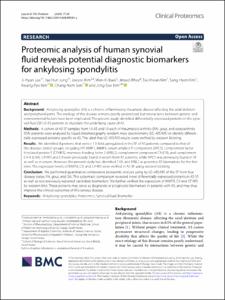Proteomic analysis of human synovial fluid reveals potential diagnostic biomarkers for ankylosing spondylitis
- Alternative Author(s)
- Baek, Won Ki; Kim, Sang Hyon; Son, Chang Nam
- Journal Title
- Clinical proteomics
- ISSN
- 1559-0275
- Issued Date
- 2020
- Keyword
- Ankylosing spondylitis; Proteomics; Synovial fluid; Biomarker
- Abstract
- Background:
Ankylosing spondylitis (AS) is a chronic inflammatory rheumatic disease affecting the axial skeleton and peripheral joints. The etiology of this disease remains poorly understood, but interactions between genetic and environmental factors have been implicated. The present study identified differentially expressed proteins in the synovial fluid (SF) of AS patients to elucidate the underlying cause of AS.
Methods:
A cohort of 40 SF samples from 10 AS and 10 each of rheumatoid arthritis (RA), gout, and osteoarthritis (OA) patients were analyzed by liquid chromatography tandem mass spectrometry (LC–MS/MS) to identify differentially expressed proteins specific to AS. The label-free LC–MS/MS results were verified by western blotting.
Results:
We identified 8 proteins that were > 1.5-fold upregulated in the SF of AS patients compared to that of the disease control groups, including HP, MMP1, MMP3, serum amyloid P-component (APCS), complement factor H-related protein 5 (CFHR5), mannose-binding lectin 2 (MBL2), complement component C9 (C9), and complement C4-A (C4A). CFHR5 and C9 were previously found in serum from AS patients, while APCS was previously found in SF as well as in serum. However, the present study has identified C4A, and MBL2 as potential AS biomarkers for the first time. The expression levels of MMP3, C9, and CFHR5 were verified in AS SF using western blotting.
Conclusion:
We performed quantitative comparative proteomic analysis using by LC–MS/MS of the SF from four disease states: RA, gout, and OA. This systematic comparison revealed novel differentially expressed proteins in AS SF, as well as two previously reported candidate biomarkers. We further verified the expression of MMP3, C9 and CFHR5 by western blot. These proteins may serve as diagnostic or prognostic biomarkers in patients with AS, and may thus improve the clinical outcomes of this serious disease.
- Publisher
- School of Medicine (의과대학)
- Citation
- Ji-Hyun Lee et al. (2020). Proteomic analysis of human synovial fluid reveals potential diagnostic biomarkers for ankylosing spondylitis. Clinical proteomics, 17, 20. doi: 10.1186/s12014-020-09281-y
- Type
- Article
- ISSN
- 1559-0275
- Appears in Collections:
- 1. School of Medicine (의과대학) > Dept. of Internal Medicine (내과학)
1. School of Medicine (의과대학) > Dept. of Microbiology (미생물학)
- 파일 목록
-
-
Download
 oak-2020-0271.pdf
기타 데이터 / 1.67 MB / Adobe PDF
oak-2020-0271.pdf
기타 데이터 / 1.67 MB / Adobe PDF
-
Items in Repository are protected by copyright, with all rights reserved, unless otherwise indicated.